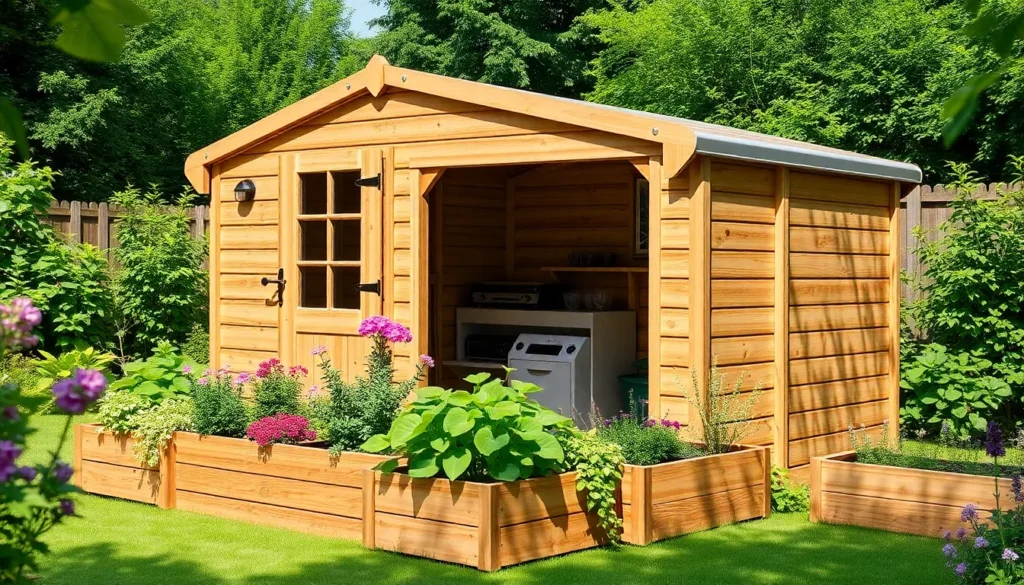In a world where plastic seems to multiply like rabbits and climate change is the hot topic at every dinner party, sustainable living books are like treasure chests filled with golden nuggets of wisdom. These books don’t just preach; they offer practical tips, relatable stories, and maybe even a few chuckles along the way. Who knew saving the planet could come with a side of humor?
Table of Contents
ToggleOverview of Sustainable Living Books
Sustainable living books offer practical solutions for eco-friendly lifestyles, addressing the urgent need to reduce plastic waste and combat climate change. These resources span various topics, ranging from zero waste practices to permaculture techniques, providing readers with actionable steps to minimize their environmental footprint.
Many authors share personal anecdotes and usable humor, making complex issues approachable and relatable. Such narratives inspire readers to engage with sustainability in their daily lives, drawing them into actions that support eco-friendly habits.
Books in this genre often include guides, workbooks, and inspiring treatises. Guides typically feature step-by-step processes for making sustainable choices, while workbooks engage readers through interactive exercises. Inspiring treatises motivate individuals to rethink their lifestyle choices, emphasizing mindfulness and intentional living.
Reader preferences vary, leading to a diverse selection of topics. Some individuals seek out books focused on clean cooking or sustainable fashion. Others may explore urban gardening or renewable energy solutions.
Notable titles contribute significantly to this movement. For example, “Zero Waste Home” by Bea Johnson emphasizes practical steps to reduce waste in daily living. Additionally, “The Omnivore’s Dilemma” by Michael Pollan offers insights into food sourcing and consumption in a sustainable context. Together, these works create a comprehensive understanding of sustainable living.
Readers looking for inspiration and practical advice find value in this genre. Sustainable living books serve as crucial tools for fostering environmental awareness and promoting positive changes in everyday life.
Benefits of Reading Sustainable Living Books
Sustainable living books offer numerous advantages for readers seeking to enhance their eco-consciousness and implement green practices in their lives.
Environmental Awareness
Reading sustainable living books significantly boosts environmental awareness. These books delve into pressing issues like plastic pollution and climate change, presenting them in engaging formats. Readers often discover the long-term impacts of their choices through relatable narratives and data-driven insights. Understanding the relationship between everyday actions and environmental consequences fosters a deeper commitment to sustainability. Many titles link personal health to environmental well-being, showing that conscious living benefits both individuals and the planet. This heightened awareness motivates individuals to embrace sustainable practices.
Practical Tips for Everyday Life
Sustainable living books abound with practical tips for everyday life. Readers find easy-to-follow guides highlighting actionable steps to reduce waste and conserve energy. Practical strategies include meal planning to minimize food waste and using eco-friendly products. Individuals can turn learning into action with workbook-style formats, making the process interactive. Great examples feature recipes using seasonal ingredients and DIY cleaning solutions that are safe for the environment. By integrating these tips, readers can quickly adopt sustainable habits, transforming their lifestyles one choice at a time.
Top Sustainable Living Books to Read
Sustainable living books offer valuable insights for those aiming to lead eco-friendly lifestyles. These books inspire readers to adopt practices that reduce their environmental impact.
Classic Titles
“Zero Waste Home” by Bea Johnson stands out as a pioneering guide that introduced many to the zero waste movement. It provides practical steps for minimizing household waste, making sustainability approachable. “The Omnivore’s Dilemma” by Michael Pollan highlights sustainable food sourcing and the environmental implications of food choices. Readers gain a deeper understanding of agricultural practices and their effects on ecosystems. Another notable title, “The Sustainable(ish) Living Guide” by Jen Gale, encourages a balanced approach to eco-living without overwhelming the reader. Each classic contributes to a growing body of knowledge on sustainability.
New Releases
Recent titles also spotlight innovative ideas for sustainable living. “Regenerative Agriculture” by Richard Perkins explores farming practices that restore ecosystems while producing food. This book offers actionable strategies for those interested in transforming agricultural methods. “The Ultimate Guide to Green Parenting” by Jennifer Wallis provides parents with tips for raising eco-conscious children. It focuses on practical solutions from sustainable toys to eco-friendly baby products. “Islands of Abandonment” by Cal Flyn uniquely examines post-industrial areas that have become thriving ecosystems, revealing the resilience of nature. These new releases expand the conversation around sustainability in contemporary contexts.
How to Choose the Right Sustainable Living Book
Selecting the perfect sustainable living book involves understanding individual preferences and personal circumstances. Readers benefit from taking a moment to reflect on what resonates with them.
Identifying Your Interests
Start by exploring various topics within sustainable living. Zero waste practices, eco-friendly cooking, and sustainable fashion represent just a few categories that might pique interest. Assessing personal passions can guide the selection process effectively. Delving into reviews from other readers often provides valuable insights. Consider the author’s tone and approach; some writers blend humor with practical advice, making the content engaging. Reading the first few pages online can also reveal whether the style aligns with personal preferences.
Considering Your Lifestyle
Next, consider how daily routines impact book choices. Different lifestyles require different sustainable approaches. A family living in an urban setting may need practical tips for small spaces, while those in rural areas might explore gardening or permaculture techniques. Additionally, assess time availability for implementing suggested changes. Selecting a book that offers actionable strategies suitable for busy schedules is crucial. Choosing one that promotes gradual changes can make the transition less overwhelming. By aligning the book’s content with specific lifestyle needs, readers foster a deeper connection with sustainable living practices.
Sustainable living books are invaluable resources for anyone looking to make a positive impact on the environment. They blend practical advice with engaging narratives that inspire readers to embrace eco-friendly habits. By exploring various topics and personal stories, these books create a relatable path toward sustainability.
As readers dive into this genre, they’ll discover actionable steps that fit their lifestyles and preferences. Whether it’s adopting zero waste practices or exploring sustainable cooking, these books empower individuals to take meaningful actions. Ultimately, embracing the insights from sustainable living literature can lead to a more conscious and fulfilling way of life, contributing to a healthier planet for future generations.










